 MONTGOMERY COUNTY PUBLIC SCHOOLS
MONTGOMERY COUNTY PUBLIC SCHOOLS
 MONTGOMERY COUNTY PUBLIC SCHOOLS
MONTGOMERY COUNTY PUBLIC SCHOOLS
español | 中文 | français | tiếng Việt | 한국어 | አማርኛ
Social media can be a powerful tool to enhance education and learning. It can help Montgomery County Public Schools (MCPS) further our mission and core values by engaging students, their parents/guardians, and the community. When using this valuable tool, it is important to remember that what MCPS employees say or do on social media impacts how all of us are viewed professionally. MCPS expects employees to model good digital citizenship.
These best practices have been developed to help you engage responsibly when you participate in social media activity. They will be updated annually to reflect the evolving social media landscape. They build upon the foundation set forth in the MCPS Employee Code of Conduct, as well as other MCPS rules and regulations, such as Regulation IGT-RA, User Responsibilities for Computer Systems, Electronic Information, and Network Security, and all applicable federal and state laws, and Board of Education policies. These requirements are collectively referenced as MCPS rules.
MCPS rules apply online as well as in our schools and workplaces. Just like in any other work activities, we are all expected to interact with all students, parents/guardians, colleagues, and the community with integrity and professionalism. Whether online or in the classroom, employees should refrain from any action or conduct that
Social media is any form of web-based or mobile technology that allows interactive communication. Common social media platforms include:
Other common electronic communication tools include online forums, messaging apps, and text messaging. While these tools aren't technically social media, it is important to note that the same rules apply to them.
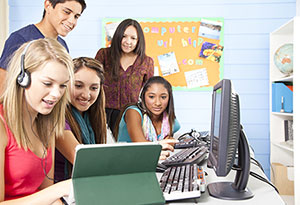
Professional social media is work-related and used to connect with the school community. Professional accounts and sites should be set up with your professional email address.
Personal social media is non-work-related. For example, you might use it to connect with friends and family. Personal social media accounts and sites should be set up with your personal email address.
Keep in mind that even your personal social media activities may affect your work. MCPS employees are required to conduct their private life activities (including social media activities) in a manner that is not prejudicial to your effectiveness as an MCPS employee. Any criminal, dishonest, or other inappropriate activities may have an adverse impact on your MCPS employment. For more information, see article 22F of the MCAAP agreement, article 11A of the MCEA agreement, and article 35C of the SEIU agreement.
Do not engage in conduct that is rude or disrespectful, use vulgar language or racial slurs, or post materials that are inflammatory, defamatory, offensive, harassing or indecent.
Do not pick fights or respond to abusive comments. Contact the Department of Communications if you have concerns about a comment or user.
Do not post or forward unsubstantiated rumors.
Do not claim to speak as a MCPS or school spokesperson unless you are officially designated the job responsibility to do so.
Do not assume you are anonymous.
Do not post images of students in the classroom whose parents or guardians have not provided written consent. Additional information on student privacy is available in the Annual Notification for Directory Information and Student Privacy.
Do not use photos, videos or any information about students on personal social media sites.
Do not post images or videos that are challenging to view – for instance, images that are too blurry to determine what is occurring – or do not give your social media post context.
When posting, always demonstrate respect for others’ points of view, even if they are not offering the same in return. Avoid off-topic or offensive comments.
Is it true? Is it helpful? Is it necessary? Is it inspiring?
Give proper credit and attribution when quoting and linking to material.
Confirm that a posted hyperlink goes where it should and that the content is appropriate.
Do not post presentations or videos using popular music, or any music or art that you have not obtained the appropriate permissions for use. For example, just because you purchased something for personal use does not mean you purchased the right to share it online.
Some examples include: “views are my own,” “opinions are mine,” and “views are mine.”
Users will not have a reason to follow you if they cannot expect new content.
Have fun, share your expertise, share good news, provide useful information and perspective, and add value to the conversation.
Is there student information in your photo or video that you should not share, like a student identification number or a grade? Are students – or anyone else in a photo or video – captured doing something that might be perceived as embarrassing or unflattering?
Understand what photo and video orientation looks best on the platform you are using. For instance, horizontal photos display best on Facebook and Twitter.
It is important to understand the purpose and rules of the social media sites and accounts that you use, and to have clear goals that you would like to achieve by establishing a professional social medial account. Ask yourself:
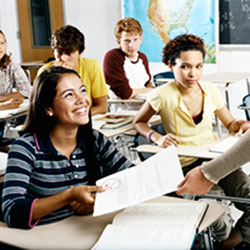
1 - include actions directly promoting the educational, instructional, administrative, business and/or support services missions of MCPS, and
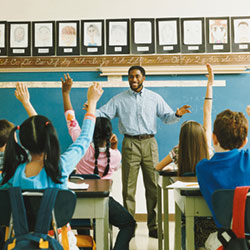
2 - are related to any instruction, project, job, work assignment, task or function for which the user is responsible.
As you consider participating in social media, you should consider what platforms your audience is using, and what platform would best help you reach your goals. MCPS provides many online tools, including Synergy ParentVUE and Google Suite for Education, among others. Remember, many platforms have terms of service that do not permit use by children younger than 13.
If an MCPS tool exists to communicate with your class and your students’ parents, it is expected that you use it when applicable. Only use non-MCPS tools if a different approach is demonstrably necessary. For instance, if teachers would like to communicate with the students in their class, they should use an available MCPS tool; if they want to communicate with the broader school community or engage in professional development online, there may be grounds to use an external social media channel like Twitter or Facebook. Or, for instance, if an athletic coach would like to share scores or updates from games with the broader school community, there may be grounds to use a tool like Twitter or Facebook. For assistance in determining what tools are available to you, contact the Department of Technology Integration and Support.
Remember, social media is a strategic communication tool. It should supplement traditional communication methods, not replace them. Additionally, it may not always be the most effective way to reach your audience.
If you need to communicate information broadly, it is expected that you contact the Department of Communications for guidance in determining what communication methods will best help you reach your intended audience. The Department of Communications provides many district-branded communication tools, including social media, with established audiences.
For instance, if your central office department needs to communicate information district-wide about a new program or initiative, it would be more effective to put an item in QuickNotes — a district-wide newsletter to families — and on district branded social media channels than it would be to create a new social media account for your department, or to use an existing account with a small audience, to promote the information.
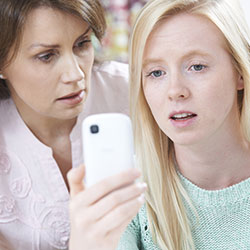
MCPS employees should notify their supervisor before establishing a professional social media account. In addition, let your supervisor know about any existing professional social media accounts not previously reported. Please remember that you are individually responsible for all of the content that you upload, post, or make available online. Additionally, please remember that employees have a limited expectation of privacy in regards to professional social media use.
If an employee has established or proposed to establish a school- or department-level account, a principal or supervisor should also have the account’s login credentials. Supervisors who have professional social media accounts are encouraged to follow their employees’ professional accounts.
MCPS supervisors and other designated MCPS personnel have the right to audit professional social media and online activity. Additionally, MCPS supervisors can request that posts and/or accounts be deleted if they do not adhere to the law or MCPS rules; employees who do not adhere to the law or MCPS rules may be subject to progressive discipline.
Parents/guardians of students must be notified in advance about any new social media activities in which their children will be asked to participate. That notification can occur in the same manner that schools communicate with families about other classroom and school activities. Employees also must review the social media site’s regulations and determine at what age children are allowed to use it.
Always use an MCPS email address to create professional social media accounts. Never use your personal email address. MCPS employees should ensure that any professional social media accounts include clearly stated language to differentiate them from personal accounts. If your department, office, or school has a social media account, the name of the department, office, or school should be part of the username and/or handle, instead of the name of the individual posting. If you have an individual professional social media account, it should be clear that the account is yours and that you are not speaking on behalf of MCPS. Existing professional social media account names or descriptions that do not clearly identify the professional purpose of the account should be amended as soon as possible. For example, an Instagram account named @mrjohnson_tenthgradeclass with an account description stating, “Created by Mr. Johnson/Posts are my own” is acceptable. But an Instagram account named @samjohnson could lead a user to believe the account is Mr. Johnson’s personal Instagram account. If you need additional guidance, contact the MCPS Department of Communications for assistance.
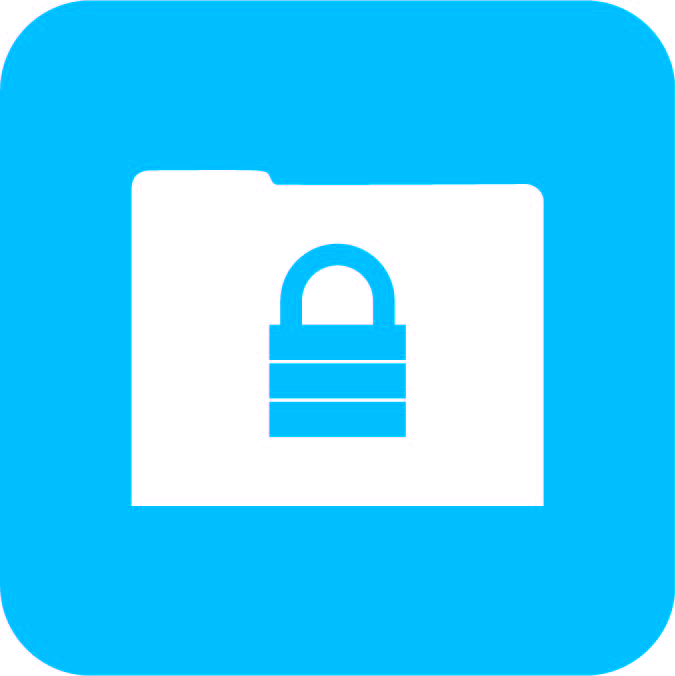 Employees are responsible for understanding the rules, terms, and privacy settings of the social media sites they are using. Appropriate privacy settings should be used on professional social media accounts. However, keep in mind that nothing online is truly private. Even if privacy settings are set properly, anyone that you allow to see your profile can copy and paste text and send it to someone else. Even if you delete information, it still may be stored on a website's server for a longer period of time.
Employees are responsible for understanding the rules, terms, and privacy settings of the social media sites they are using. Appropriate privacy settings should be used on professional social media accounts. However, keep in mind that nothing online is truly private. Even if privacy settings are set properly, anyone that you allow to see your profile can copy and paste text and send it to someone else. Even if you delete information, it still may be stored on a website's server for a longer period of time.
You are also responsible for maintaining the security of the social media accounts that you use, and you are fully responsible for all activities that occur under your password or account. Make sure to create strong passwords and protect them; immediately notify your supervisor of any unauthorized use of your password or account or any other breach of security, and log out of your account at the end of each session.
You’re encouraged to use MCPS computers or other professional devices to update professional accounts. Use good judgment when posting to social media accounts. Treat your professional social media account like an extension of your workplace. Be respectful of diverse opinions and beliefs of other employees, parents/guardians and others in the school community. Consider how you would feel if what you posted was published on the front page of The Washington Post or its website, for instance, or went viral. Keep in mind that the same rules apply when sharing other people’s content, including retweeting and sharing links, so it is important to think critically when determining what to share.
In alignment with recent court decisions, MCPS employees posting to social media in a professional capacity should not block users or delete comments on their own initiative. If you have concerns about the behavior of a user on your social media channels, please contact the Department of Communications.
MCPS employees are prohibited from disclosing, through posts on social media sites or by any other means, any confidential information obtained in their work duties, including any personally identifiable information about students or their families, as well as personnel records.
Consider your posting frequency. While it is important to keep social media accounts updated, if you are posting all the time, are you performing your job effectively?
For student privacy reasons, MCPS employees should avoid posting images where students are individually identifiable in a classroom setting. For instance, consider using images of students’ hands or backs of their heads to illustrate a classroom activity. Videos or photos that depict students’ faces are more appropriate if they are from a sporting event, performance, or other event open to the school community, but you should still be sensitive to student privacy and mindful of what you post. When in doubt, ask. Additionally, it is important to ask permission before posting photos of colleagues online because that is something not everyone is comfortable with.
Avoid posting images where students are individually identifiable in a classroom setting.
MCPS employees should not “tag” photos of MCPS students, parents/guardians, other employees, volunteers, or contractors without the prior permission of the individuals being tagged. MCPS employees should not identify specific student populations (e.g., special education students) when tagging or captioning photos. MCPS reserves the right to remove postings and/or disable access from the MCPS network to any social media site.
 Always remember that the entire MCPS Employee Code of Conduct applies to your social media use, but some examples deserve special attention when you post online:
Always remember that the entire MCPS Employee Code of Conduct applies to your social media use, but some examples deserve special attention when you post online:
 Do not have one-on-one interactions with MCPS students through social media, e-mail, text messages, messaging apps, or other electronic communication about subjects not directly related to instruction or your MCPS work responsibilities. Communication with students via temporary or anonymous messaging apps, is prohibited.
Do not have one-on-one interactions with MCPS students through social media, e-mail, text messages, messaging apps, or other electronic communication about subjects not directly related to instruction or your MCPS work responsibilities. Communication with students via temporary or anonymous messaging apps, is prohibited. MCPS employees should report incidents of misconduct that occur on social media. Some examples include child abuse and neglect, illegal activity, online bullying, harassment, and/or intimidation by another MCPS employee or any other individual regarding or affecting their MCPS employment. Additionally, if MCPS employees see incidents of student bullying, they should report them through the process set forth in Regulation JHF-RA, Student Bullying, Intimidation and Harassment.
If you receive press inquiries regarding MCPS via social media, refer them to the Department of Communications (pio@mcpsmd.org).

Employees should also exercise caution and good judgment when using personal social media. The line between professional and personal is often blurred in the digital world. If you identify yourself as an MCPS employee on your personal accounts, you should ensure that your profile and related content are consistent with how you wish to present yourself to colleagues, parents, and students.
Think about how postings you share on social media may be interpreted by colleagues or the greater community. Ask yourself what type of image you would like to have, and would like your school or office to have, in a larger context.
Personal social media use has the potential to result in disruption at school or the workplace and can be in violation of MCPS rules, and therefore could be subject to progressive discipline. For instance, employees cannot bully, harass, or intimidate colleagues or students on their personal social media accounts.
Do not “friend” parents or students on personal accounts, and do not post images of students on personal accounts.
Be thoughtful when considering "friending" a student who is a recent graduate, as their social networks likely include current students who may then have greater access to posts on your account.
Do not use the MCPS network to make personal social media posts during the work duty day. In addition, MCPS employees are encouraged to use appropriate privacy settings to control access to their personal social media sites.
MCPS employees are prohibited from making representations on their personal social media accounts or sites that they speak (or could cause a reader to believe the employee is speaking) in an official MCPS capacity. This prohibition includes, but is not limited to, using MCPS school logos or mascots or attributing content to MCPS. However, automatically populated MCPS logos on social media sites, such as LinkedIn, are permitted.